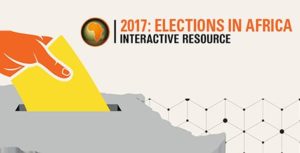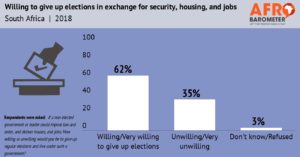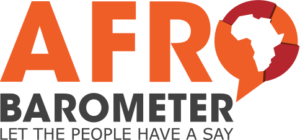Anecdotal evidence of observers accepting low-quality elections in Africa is easy to find. Yet systematic, empirical evidence has been absent — until now, argues Susan Dodsworth, a research fellow in the International Development Department at the University of Birmingham. My research shows that a double standard does exist: Western election observers are less likely to allege that significant fraud has occurred in an election in sub-Saharan Africa, compared with an election of the same quality held elsewhere, she writes for The Washington Post’s Monkey Cage:

Credit: Africa Research Institute
My analysis showed that one predictor of whether Western election observers will make an allegation of fraud in a given election is whether they made such an allegation at the last election. In short, precedent matters. Having failed to call out fraud in African elections in the past, Western observers seem less likely to do so in the future. This suggests that international observers could monitor their practices to avoid developing a habitual response to elections in a given country, accepting a lower standard simply because that was the case in earlier elections.
A number of leading international observers are actively looking for ways to improve their work, adds Dodsworth, whose research focuses on democracy assistance and the politics of development aid. As they do so, finding ways to protect their credibility will probably emerge as a top priority. This means ensuring international observers judge African elections against the same standards as elections held elsewhere, and ensuring the world sees they do so.
 “Decent work and economic growth” is Africans’ highest priority among the United Nations’ Sustainable Development Goals (SDGs), but is also an area where governments are performing particularly poorly, says the latest Afrobarometer survey. Other highly prioritized SDGs include those focusing on hunger, health, and “peace, justice and strong institutions.”
“Decent work and economic growth” is Africans’ highest priority among the United Nations’ Sustainable Development Goals (SDGs), but is also an area where governments are performing particularly poorly, says the latest Afrobarometer survey. Other highly prioritized SDGs include those focusing on hunger, health, and “peace, justice and strong institutions.”
 Ghana was the best performing country in Sustainable Development Goals (SDGs) among 34 countries, said the report, which links the “most important problems” identified by more than 45,800 Africans, as well as their assessments of their governments’ performance on these issues, to the goals of the UN Agenda 2030 for Sustainable Development. Ghana scored the highest mark of 68% with regard to being able to meet most of its citizens’ priorities, said Afrobarometer, a partner of the National Endowment for Democracy.
Ghana was the best performing country in Sustainable Development Goals (SDGs) among 34 countries, said the report, which links the “most important problems” identified by more than 45,800 Africans, as well as their assessments of their governments’ performance on these issues, to the goals of the UN Agenda 2030 for Sustainable Development. Ghana scored the highest mark of 68% with regard to being able to meet most of its citizens’ priorities, said Afrobarometer, a partner of the National Endowment for Democracy.







